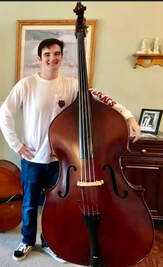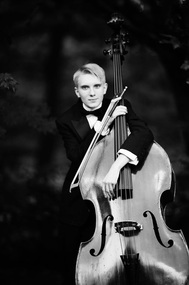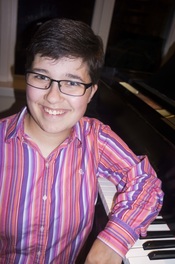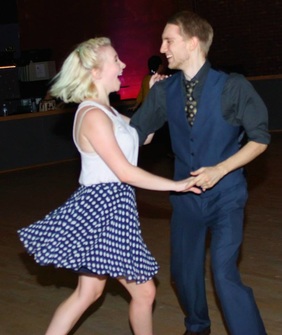The Bridge
The Bridge is a place for students, teachers, and parents to connect by sharing their stories, tips, videos, etc. If you would like to share your story, please CONTACT the doubleBASSbridge and your story could appear here!

June, 2020
Reid Whitecotton just completed his freshman year at Central Washington University
From the perspective of a percussionist...now bassist by Reid Whitecotton
I find it very interesting how important technique is. Technique that I was taught in drumline was taught more for the purpose of avoiding injury than for getting a nice tone. That being said, technique is still extremely important for a percussionist to sound good, but I was able still to get by without really paying too much attention to it. Learning about higher level bass technique has taught me that technique is important for everything - from tone, to dynamics, to articulations, and to avoiding injury. If you want to take any advice from me, I would advise that practicing the basics and exercises with great technique is just as important as practicing Bach, Sturm, Dittersdorf, or any other more complicated piece. Practicing technique makes everything come together with less effort.
Here is Reid's end of the year performance of the Dittersdorf Concerto:
Reid Whitecotton just completed his freshman year at Central Washington University
From the perspective of a percussionist...now bassist by Reid Whitecotton
I find it very interesting how important technique is. Technique that I was taught in drumline was taught more for the purpose of avoiding injury than for getting a nice tone. That being said, technique is still extremely important for a percussionist to sound good, but I was able still to get by without really paying too much attention to it. Learning about higher level bass technique has taught me that technique is important for everything - from tone, to dynamics, to articulations, and to avoiding injury. If you want to take any advice from me, I would advise that practicing the basics and exercises with great technique is just as important as practicing Bach, Sturm, Dittersdorf, or any other more complicated piece. Practicing technique makes everything come together with less effort.
Here is Reid's end of the year performance of the Dittersdorf Concerto:

June 8, 2016
Tomick Necessary just completed his freshman year at Pacific Lutheran University
Becoming a Confident Player by Tomick Necessary
I started playing the bass in 7th grade after switching from violin. After about a year of playing I started taking lessons with Dr. Jensen. Having her as my teacher for the last 6 years has greatly helped my playing because I get to continue to work with someone who knows my strengths and weaknesses and how to work with them. This has been especially helping when I perform. I have never been huge on my ability to perform on my instrument, I tend to get nervous and lose my confidence.
My lack of confidence in my playing at a young age is one of the reasons I am working to becoming a music teacher. I want to help those kids who aren’t comfortable in their musicianship skills because I know how it feels. I feel incredible satisfaction when one of my students overcome a difficulty because I know how hard it can be when you aren’t confident in yourself.
Over the years I have worked to develop my confidence. The main way I have built my confidence is by starting to swing dance. With dancing, just like with playing a solo, there is no one to hide behind. You have to be able to put yourself out there and give it your best shot. Dancing has helped tremendously because it is something that you almost always have to do with a partner, which means that after every dance there is almost immediate feedback about how I did, whether verbal or not. This enormous amount of feedback helps me better my technique and have more enjoyable dances every time. While improving my dancing doesn’t translate to improving my bass technique, knowing that I am continually getting better helps my confidence in everything else I do. Being able to put myself out there in a way that isn’t just performing on my instrument has helped me be more confident in myself when I do end up performing. I have started to think of performing as dancing. I am working for about 4 or 5 minutes and then I am done. If it went well, that it is great, but if it didn’t, I know that I will always have another chance to show what I can do.
Tomick Necessary just completed his freshman year at Pacific Lutheran University
Becoming a Confident Player by Tomick Necessary
I started playing the bass in 7th grade after switching from violin. After about a year of playing I started taking lessons with Dr. Jensen. Having her as my teacher for the last 6 years has greatly helped my playing because I get to continue to work with someone who knows my strengths and weaknesses and how to work with them. This has been especially helping when I perform. I have never been huge on my ability to perform on my instrument, I tend to get nervous and lose my confidence.
My lack of confidence in my playing at a young age is one of the reasons I am working to becoming a music teacher. I want to help those kids who aren’t comfortable in their musicianship skills because I know how it feels. I feel incredible satisfaction when one of my students overcome a difficulty because I know how hard it can be when you aren’t confident in yourself.
Over the years I have worked to develop my confidence. The main way I have built my confidence is by starting to swing dance. With dancing, just like with playing a solo, there is no one to hide behind. You have to be able to put yourself out there and give it your best shot. Dancing has helped tremendously because it is something that you almost always have to do with a partner, which means that after every dance there is almost immediate feedback about how I did, whether verbal or not. This enormous amount of feedback helps me better my technique and have more enjoyable dances every time. While improving my dancing doesn’t translate to improving my bass technique, knowing that I am continually getting better helps my confidence in everything else I do. Being able to put myself out there in a way that isn’t just performing on my instrument has helped me be more confident in myself when I do end up performing. I have started to think of performing as dancing. I am working for about 4 or 5 minutes and then I am done. If it went well, that it is great, but if it didn’t, I know that I will always have another chance to show what I can do.

April 14, 2016
Domi Edson is a freshman at Central Washington University. Here is her story...
From Clarinet to Bass by Domi Edson
I initially came to CWU as a clarinet major who played bass in the jazz band. With essentially no experience with arco playing, let alone classical music, and a strong love of jazz, I had no intention of becoming very proficient with the bow or even playing bass full time. Right before school started, the music counselor advised me to take bass lessons as a secondary instrument as I received a scholarship for my jazz playing. I contacted Dr. Jensen, who promised it would be very low commitment- only 30 minutes a day- so I decided to go along thinking the technique would help my jazz playing. As fall quarter went on, I slowly began to fall in love with the classical side of the bass in. My clarinet practice hours waned to make room for more arco practice than I had originally intended. Bass lessons and studio became one the highlights of my week, and I had to work harder to motivate myself to play the clarinet as the quarter went on. It got to a point where after my clarinet jury, not faced with deadlines or specific assignments, I didn’t practice over all of winter break. Instead I practiced bass technique, and even learned and memorized my jury piece for the end of winter quarter. My bass even came with me on a road trip to Idaho and I made time to squeeze practicing in among visiting my extended family. This got me thinking- if all I wanted to do was play bass, classical and jazz, why was I a clarinet major?
I emailed Dr. Jensen asking if it was a possibility to switch to a bass major, and as soon as she enthusiastically said yes, I had made up my mind. Although too late to audition for orchestra, I went about formally switching as soon as I got back to school. I still played clarinet in band, but was no longer in the clarinet studio, opening up much more time to play bass. The time in a practice room started to pay off when I was asked to play on the string studio recital- a mere 4 months after learning how to hold a bow! For spring quarter, I got into orchestra and moved up a band in jazz- I had accomplished my original goal of learning classical music to become a better jazz player, and got the unexpected outcome of falling in love with arco playing and switching to a bass major!
But why bass? I’ve played piano and clarinet for longer and have always loved music, but nothing clicked like the bass did. I felt I connected with the other bassists and Dr. Jensen more than my clarinet colleagues, but above all I just feel the bass is the most representative of my voice. I like being the rock at the back of an ensemble and love the beautiful low tones I can produce. I know it’s the right instrument for me as I’ve never been so motivated or excited to get down into the grit of practicing on a regular basis on any other instrument, and when I learn a piece well enough to put myself into it, I gain the most satisfaction.
Domi Edson is a freshman at Central Washington University. Here is her story...
From Clarinet to Bass by Domi Edson
I initially came to CWU as a clarinet major who played bass in the jazz band. With essentially no experience with arco playing, let alone classical music, and a strong love of jazz, I had no intention of becoming very proficient with the bow or even playing bass full time. Right before school started, the music counselor advised me to take bass lessons as a secondary instrument as I received a scholarship for my jazz playing. I contacted Dr. Jensen, who promised it would be very low commitment- only 30 minutes a day- so I decided to go along thinking the technique would help my jazz playing. As fall quarter went on, I slowly began to fall in love with the classical side of the bass in. My clarinet practice hours waned to make room for more arco practice than I had originally intended. Bass lessons and studio became one the highlights of my week, and I had to work harder to motivate myself to play the clarinet as the quarter went on. It got to a point where after my clarinet jury, not faced with deadlines or specific assignments, I didn’t practice over all of winter break. Instead I practiced bass technique, and even learned and memorized my jury piece for the end of winter quarter. My bass even came with me on a road trip to Idaho and I made time to squeeze practicing in among visiting my extended family. This got me thinking- if all I wanted to do was play bass, classical and jazz, why was I a clarinet major?
I emailed Dr. Jensen asking if it was a possibility to switch to a bass major, and as soon as she enthusiastically said yes, I had made up my mind. Although too late to audition for orchestra, I went about formally switching as soon as I got back to school. I still played clarinet in band, but was no longer in the clarinet studio, opening up much more time to play bass. The time in a practice room started to pay off when I was asked to play on the string studio recital- a mere 4 months after learning how to hold a bow! For spring quarter, I got into orchestra and moved up a band in jazz- I had accomplished my original goal of learning classical music to become a better jazz player, and got the unexpected outcome of falling in love with arco playing and switching to a bass major!
But why bass? I’ve played piano and clarinet for longer and have always loved music, but nothing clicked like the bass did. I felt I connected with the other bassists and Dr. Jensen more than my clarinet colleagues, but above all I just feel the bass is the most representative of my voice. I like being the rock at the back of an ensemble and love the beautiful low tones I can produce. I know it’s the right instrument for me as I’ve never been so motivated or excited to get down into the grit of practicing on a regular basis on any other instrument, and when I learn a piece well enough to put myself into it, I gain the most satisfaction.
|
|
This is Domi's first ever solo double bass performance with the bow! She is performing Waltz #10 by Dragonetti. Since switching to the double bass, Domi has been instrumental in starting up CWU's Bass Club and is the acting president. |

